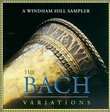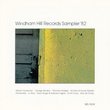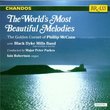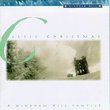| All Artists: Eamon Dougan, Tomaso Albinoni, Johannes Brahms, Frank [1] Martin, William [Composer] Byrd, Gabriel Faure, Georges Bizet, Franz [Vienna] Schubert, Antonio Lotti, Claudio Monteverdi, Anton Bruckner, Henry Purcell, Johann Sebastian Bach, Matthew Halls, Matt Hall Title: Agnus Dei II: Music to soothe the soul Members Wishing: 0 Total Copies: 1 Label: Erato Release Date: 6/16/1998 Genres: Special Interest, Pop, Classical Styles: Vocal Pop, Opera & Classical Vocal, Historical Periods, Baroque (c.1600-1750), Early Music, Sacred & Religious Number of Discs: 1 SwapaCD Credits: 1 UPC: 639842165921 |
Search - Eamon Dougan, Tomaso Albinoni, Johannes Brahms :: Agnus Dei II: Music to soothe the soul
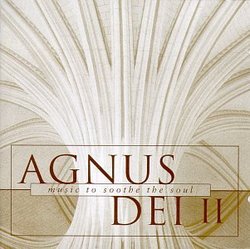 | Eamon Dougan, Tomaso Albinoni, Johannes Brahms Agnus Dei II: Music to soothe the soul Genres: Special Interest, Pop, Classical
Building on the enormous success of the first Agnus Dei disc, its successor offers more of the same musical mood, but with a few surprises too. One of the hits of the first album was John Cameron's arrangement of Elgar's N... more » ![header=[] body=[This CD is available to be requested as disc only.]](/images/attributes/disc.png?v=a4e11020) ![header=[] body=[This CD is available to be requested with the disc and back insert.]](/images/attributes/disc_back.png?v=a4e11020) ![header=[] body=[This CD is available to be requested with the disc and front insert.]](/images/attributes/disc_front.png?v=a4e11020) ![header=[] body=[This CD is available to be requested with the disc, front and back inserts.]](/images/attributes/disc_front_back.png?v=a4e11020) |
Larger Image |
CD DetailsSynopsis
Amazon.com Building on the enormous success of the first Agnus Dei disc, its successor offers more of the same musical mood, but with a few surprises too. One of the hits of the first album was John Cameron's arrangement of Elgar's Nimrod, using the words of the Lux Aeterna. Here he really rolls his sleeves up and similarly tackles the Albinoni-Giazzoto Adagio (using the words of the Beatitudes) and the Intermezzo from Bizet's second L'Arlésienne Suite (using the text of the Agnus Dei). The role of the orchestra (the excellent ensemble Capricorn) has been expanded, and Edward Higginbottom himself has arranged a delicious string septet accompaniment to Brahms's Geistliches Lied. Much of the music is of the kind that the choir obviously eats for breakfast--which is not to say that they ever sound bland or tired, just at home. The one weak track is Monteverdi's Beatus Vir, which needs voices of more sophistication and agility than the boys can provide. That aside, this is another album that should do their reputation no harm. --Warwick Thompson Similarly Requested CDs
|
CD ReviewsAwesome music - fidelity a bit lacking 02/16/1999 (4 out of 5 stars) "The opening song "The Beatitudes" by Albinoni is incredibly moving, so much so that the other songs have a hard time comparing. Overall, excellent, although the fidelity could be greatly improved. I had to crank up my volume 30-40% higher to achieve a comparable volume and noticed some distortion (in the recording, not my system) that was a bit distracting. Still, an outstanding CD." Good choral CD, but . . . Mark Marshall | Corpus Christi, Texas | 01/22/2006 (4 out of 5 stars) "Agnus Dei II is a really good choral CD with a more otherworldly sound than most choral offerings. But the first Agnus Dei is better, amazing really. Own both, but if you only want one, get the first one." Could be better MDW | Syracuse, NY USA | 07/08/2006 (2 out of 5 stars) "After owning Agnus Dei I for years, and somehow misplacing the CD, I decided to buy both I and II from Amazon. Of the CD's, I is still my favorite. Agnus Dei II is a decent CD, but it doesn't have the fluidity or the dynamics that the first disk has. I guess I got spoiled with the first disk."
|

 Track Listings (14) - Disc #1
Track Listings (14) - Disc #1